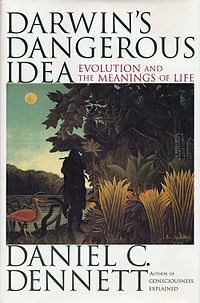Darwin's Dangerous Idea

Cover of the first edition
|
|
| Author | Daniel C. Dennett |
|---|---|
| Subject | Evolution, ethics |
| Published | 1995 (Simon & Schuster) |
| Media type | Print (hardcover and paperback) |
| Pages | 586 |
| ISBN | |
| OCLC | 34925327 |
| Preceded by | Consciousness Explained |
| Followed by | Kinds of Minds: Toward an Understanding of Consciousness |
Darwin's Dangerous Idea: Evolution and the Meanings of Life is a 1995 book by Daniel Dennett, in which Dennett looks at some of the repercussions of Darwinian theory. The crux of the argument is that, whether or not Darwin's theories are overturned, there is no going back from the dangerous idea that design (purpose or what something is for) might not need a designer. Dennett makes this case on the basis that natural selection is a blind process, which is nevertheless sufficiently powerful to explain the evolution of life. Darwin's discovery was that the generation of life worked algorithmically, that processes behind it work in such a way that given these processes the results that they tend toward must be so.
Dennett says, for example, that by claiming that minds cannot be reduced to purely algorithmic processes, many of his eminent contemporaries are claiming that miracles can occur. These assertions have generated a great deal of debate and discussion in the general public. The book was a finalist for the 1995 National Book Award in non-fiction and the 1996 Pulitzer Prize for General Non-Fiction.
Dennett's previous book was Consciousness Explained (1991). Dennett noted discomfort with Darwinism among not only lay people but also even academics and decided it was time to write a book dealing with the subject.Darwin's Dangerous Idea is not meant to be a work of science, but rather an interdisciplinary book; Dennett admits that he does not understand all of the scientific details himself. He goes into a moderate level of detail, but leaves it for the reader to go into greater depth if desired, providing references to this end.
In writing the book, Dennett wanted to "get thinkers in other disciplines to take evolutionary theory seriously, to show them how they have been underestimating it, and to show them why they have been listening to the wrong sirens." To do this he tells a story; one that is mainly original but includes some material from his previous work.
...
Wikipedia
